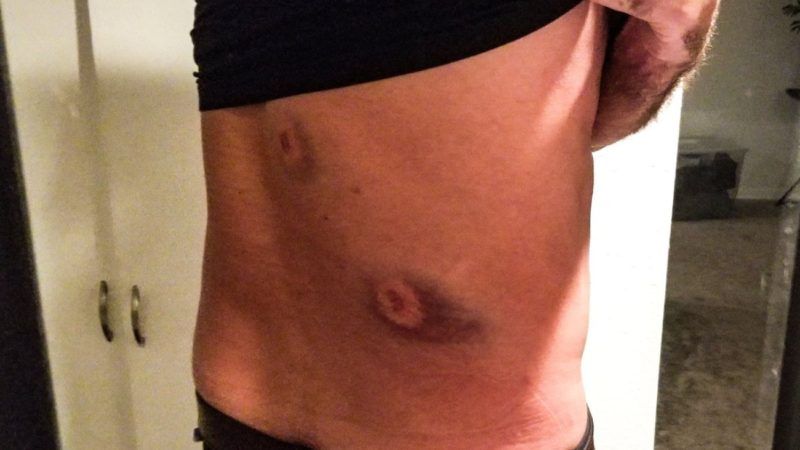Judge Orders Federal Officers in Portland To Stop Harassing and Assaulting Journalists and Legal Observers
U.S. District Judge Michael Simon reminds the feds that they are bound by the First Amendment.

A federal judge in Oregon yesterday issued a temporary restraining order that bars the U.S. Department of Homeland Security and the U.S. Marshals Service from "arresting, threatening to arrest, or using physical force" against journalists or legal observers at the ongoing Portland protests against police brutality. Responding to a lawsuit filed by the American Civil Liberties Union of Oregon, U.S. District Judge Michael Simon, who on July 2 issued a similar order against Portland police, also said federal agents may not order journalists and legal observers to disperse or confiscate their press passes, cameras, or audio recorders.
"Open government has been a hallmark of our democracy since our nation's founding," Simon writes, quoting a 2012 decision in which the U.S. Court of Appeals for the 9th Circuit upheld the "well-established" First Amendment right to observe government activities. "When wrongdoing is underway, officials have great incentive to blindfold the watchful eyes of the Fourth Estate….The free press is the guardian of the public interest, and the independent judiciary is the guardian of the free press." The ACLU lawsuit, Simon adds, "tests whether these principles are merely hollow words."
The ACLU's complaint, filed on behalf of the Portland Mercury, eight journalists, and two observers working with the ACLU, alleges that federal agents stationed at the Mark O. Hatfield U.S. Courthouse have joined local police in violating those principles. On July 12, for instance, federal officers shot photographer Mathieu Lewis-Rolland 10 times with "impact munitions" that left "severe lacerations, welts, and bruises all over his upper body." According to the Geneva Guidelines on Less-Lethal Weapons and Related Equipment in Law Enforcement, such projectiles "should generally only be used in direct fire against the lower body of a violent individual when a substantial risk exists of immediate serious injury to either a law enforcement official or a member of the public."
The complaint alleges many similar abuses by Portland police, including the gratuitous use of tear gas and rubber bullets, unprovoked beatings, unlawful arrests, and other interference with activities protected by the First Amendment. The ACLU says the plaintiffs who have suffered such abuse were clearly identified as journalists or legal observers.
The lawsuit also complains that Portland police have routinely violated Simon's June 9 order barring them from using tear gas at the protests except when "the lives or safety of the public or the police are at risk." Simon said tear gas should not be used simply "to disperse crowds where there is no or little risk of injury." Portland Mayor Ted Wheeler, who is also the police commissioner, got a taste of his own medicine on Wednesday night, when he was gassed by federal officers while vainly trying to show protesters that he was united with them in opposing the Trump administration's response to the demonstrations.
The protests in Portland have been happening every day since May 28, three days after a Minneapolis police officer suffocated George Floyd. The federal officers, who according to an internal memo have not been trained in controlling riots or mass demonstrations, were deployed by the Trump administration this month, ostensibly to protect the courthouse and other federal property. But as Nancy Rommelmann notes, the federal presence seems to have inflamed the situation, provoking the vandalism and assaults on the courthouse that the administration now cites to justify its involvement.
"Plaintiffs fear for their safety from federal agents' violence," the ACLU says. "Since President Trump ordered federal agents to go to Portland to quell protests, federal agents have been working together with Portland police to violently disperse demonstrators and neutrals."
In addition to shooting Lewis-Rolland, federal officers have been accused of firing tear gas at peaceful protesters, illegally grabbing protesters off the streets and detaining them without charge, and repeatedly hitting Christopher David, a middle-aged Navy veteran, with a baton, breaking his finger and fracturing his hand. David, who was also assaulted with pepper spray, told USA Today he decided to attend the protests last Saturday because he was disturbed by the reports of unlawful arrests by camouflage-clad federal officers, which last week prompted a federal lawsuit by Oregon Attorney General Ellen Rosenblum.
"What they were doing was unconstitutional," David said. "Sometimes I worry that people take the oath of office or the oath to the Constitution, and it's just a set of words that mean nothing. They really don't feel in their heart the weight of those words."
Judge Simon's order aims to remind federal officers of that oath, at least as it pertains to the First Amendment rights of journalists and legal observers. "The public streets, sidewalks, and parks historically have been open to the press and general public," he writes, "and public observation of law enforcement activities in these public fora plays a significant positive role in ensuring conduct remains consistent with the Constitution."


Show Comments (193)